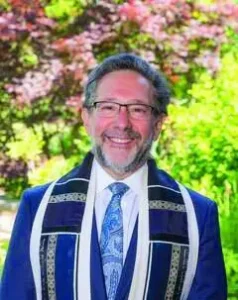
Rabbi Gregory S. Marx
Parshat Vaera
In Parshat Vaera, God speaks to Moses and self-identifies as Adonai. God continues to say that the divine appeared to Abraham, Isaac and Jacob by a different name, El Shaddai, and that God was not revealed to them as Adonai.
It was only later that God is referred to by the tetragrammaton, God’s four-letter name, yod-hay-vav-hay, which we pronounce as “Adonai.” So, why would God need to say that to Moses and, furthermore, why the need to proclaim the unity of the divine despite being called by different names?
I suspect that the ancient ancestors were a diverse community; some must have referred to God by one name, while others identified God differently. They saw in the diverse names different characteristics, traits and capabilities.
For some, God was the presence of justice in the face of evil, while for others, God offered mercy in the face of sin. God was worshipped by a diverse community. Moses, about to confront the most powerful person in the ancient world, Pharaoh, needed to know whom he was representing. So, God reminds Moses of the unity of the divine and of the community that adorates Him.
We live in a time when we are confronted by a multiplicity of challenges. We are a varied community with different perspectives and understandings of God, as well as politics.
Just recently, I was speaking to a friend of mine, who is a rabbi, and she told me, as we began the conversation, “I just wanted to tell you, I’m a Trump supporter.” I asked myself why was that statement necessary? Our friendship transcended politics. Our relationship was deeper than Republican or Democrat. But somehow there was a concern that our friendship might be jeopardized because of the divisive politics of today.
One of our greatest challenges today is antisemitism. It is our modern-day Pharaoh. It is high time we recognize our unity, just as God reminded Moses of the divine unity despite “knowing God differently throughout the ages.” It is high time that we put away our political differences, as well as our religious ones and stand shoulder to shoulder against the rising hate and heat of antisemitism of our time.
Further in Exodus, God says, “I have heard the moaning of the Israelites and I have remembered my covenant.” 6:5 No matter what transpires, or how we act or believe or practice, God will be with us. Suffering transcends divisiveness. We are all one as we confront hate. The antisemite does not care if a particular Jew keeps kosher or not. The Jew-hater couldn’t care less if a Jew is a Democrat or a Republican. We are one.
I suggest that we need to do three things to confront antisemitism.
First, we must not be afraid to call hate out when we see it. We must not shrink from the challenge of calling out the haters, even if it strengthens the hand of those who hold us in antipathy.
Second, we must build alliances with other like-minded people. We are a tiny minority and need friends in high places as well as in the common marketplace. I am pleased that our community has continually endeavored to build bridges and relationships that force us to stretch. We do so in the deeply held belief that we cannot confront hate alone, nor can our allies. We must seek partners with whom we can stand and, likewise, who will be there for us. My synagogue, Beth Or, marched with the members of Bethlehem Baptist Church following the shootings in a North Carolina church as they came to pray with us following the attacks in Pittsburgh and Poway.
Finally, and most importantly, we must stop being our own worst enemies and sniping at each other because we are a diverse community; enough with the attacks that you are “too liberal,” “too extreme,” not “red enough” or “too progressive.” We have always had our differences, as our Torah portion indicates, but God told Moses that if you are to successfully confront evil in the form of Pharaoh, we as a people must stand as one.
The time before the Exodus demanded unity of purpose and community. Likewise, today, as we confront another formidable foe, the time for unity amidst our diversity is now.
Rabbi Gregory Marx is the senior rabbi at Congregation Beth Or in Maple Glen. The Board of Rabbis of Greater Philadelphia is proud to provide diverse perspectives on Torah commentary for the Jewish Exponent. The opinions expressed in this column are the author’s own and do not reflect the view of the Board of Rabbis.




If you only talk to people who agree with you, you become stunted and boring. You also begin to think that everyone agrees with your opinions and on the brief occasions when someone doesn’t, the world is about to come to an end. Imagine what is behind a Rabbi feeling its necessary to say to another Rabbi I’m a Trump supporter. By saying that this rabbi thinks that there is a very good chance that the response will be, goodbye. When we shrink into our own little world of politics, when we allow the politics to consume every part of who we are, who we are becomes very boring, insular and eventually narcissistic. Narcissism quickly morphs into hate and bigotry.
Proud of our RABBI !
BOB ROSIN